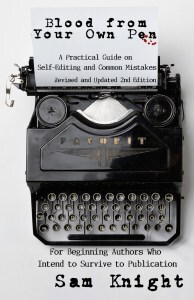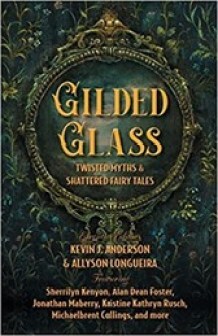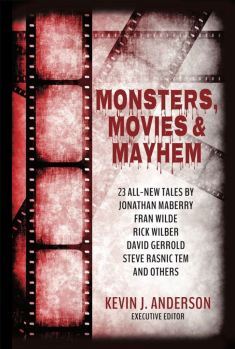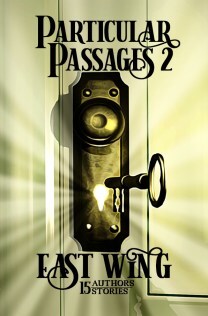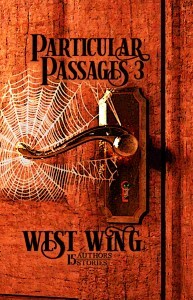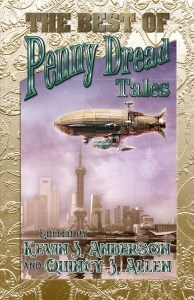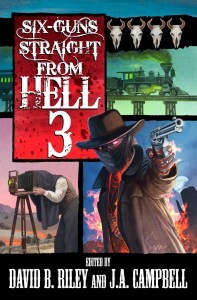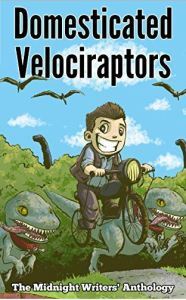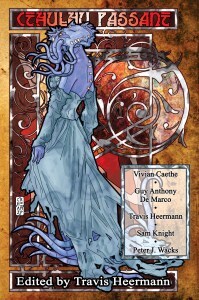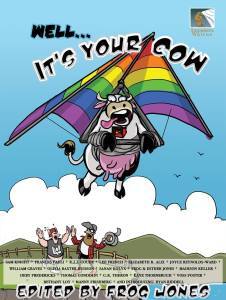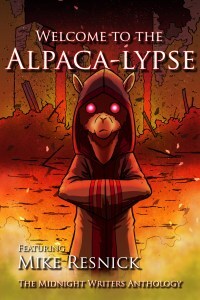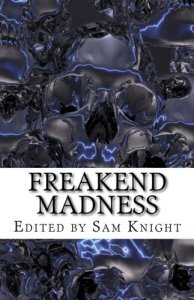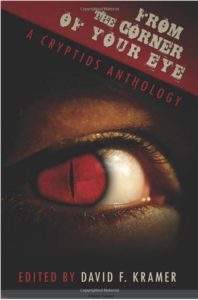Sam Knight's Blog
June 7, 2025
Permutations: A Well World Anthology is Live!
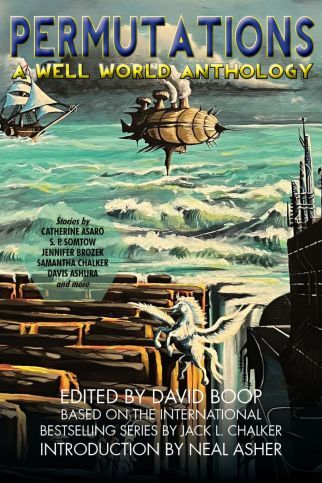 Today is the day!(Kind of.)Permutations: A Well World Anthology is Live! (in e-book anyway. There seems to have been a hiccough in the paperback version. (Man, I hate that spelling of “hiccup”, don’t you?) ) the print book is available to order, arriving after Father’s Day. (Darn!) I’m anxious for it. Why? Because I’ve been waiting for literally years(!) for it to come out! You can read a little bit about that on my Substack if you’re interested: https://authorsamknight.substack.com/p/about-permutations-a-well-world-anthologyThis anthology is not just an anthology, it is…the term I was told…a mosaic novel.That’s kind of hard to explain. Well, not really. But, also, I don’t want to ruin it. It’s obvious once you know, but if you have no idea what you’re getting into, it’s pretty cool. If you’re a fan of Jack L. Chalkeror his WellWorld series, I really think you’re gonna love this.Here is a Books2Read universal link to help you find the e-book at your favorite retailer. (And I’m hoping those print copies show up soon! I will always be a page-sniffer!): https://books2read.com/u/4NngJGA little more info:Permutations: A Well World AnthologyThe passengers and crew of the luxury starship, Euphrates, may come from different backgrounds and class levels, but what they all have in common is secrets. When their cruiser is attacked by Anti-com terrorists, the ship that comes to rescue them, however, contains a bigger secret than all of them combined. A secret that will leave them irrevocably changed physically, mentally, and emotionally. For the captain of the freighter Stehekin is both savior and devil to the people he brings aboard. He’ll be forced to drop them through a dimensional gate to a place where they’ll wake up no longer as human beings. As these lost souls adjust to their new reality, they’ll find out that, on the Well World, you adapt quickly…or die!Permutations: A Well World Anthology contains twelve NEW stories set in the universe created by the late Jack L Chalker and first introduced in the novel, Midnight at the Well of Souls. Each tale is written by an author and fan of Chalker’s groundbreaking and award-winning series spanning ten volumes. Set in a time after Midnight, these original short stories are the first to be authorized since Jack’s passing in 2005. Nine vignettes will be bookended by stories forcing these unlucky travelers to be stranded on the Well World, a place that randomly turns you into one of a thousand different alien species.Conceived by bestselling Author-Editor David Boop (who wrote the author bible, as well as the bumper stories), Boop sought out creators influenced by Chalker’s work; many who were also friends…and family! (Permutations contains a story co-authored by Jack’s daughter, Samantha Chalker!) Additionally, you’ll discover adventures by bestselling and award-winning authors such as Catherine Asaro, S.P. Somtow, Jennifer Brozek, Keith Olexa, and Marsheila Rockwell, plus a forward by the legendary Neal Asher.Table of Contents:Forward – Neal AsherIntroduction – Author-Editor David Boop1. Aboard the Freighter Stehekin2. South Polar Zone, The Well World3. Avrom – S.P. Somtow4. Wuckl – Keith Olexa5. Lamotien – Sam Knight6. Oolakash – Elektra Hammond7. Dunh’gran – Davis Ashura8. Betared – Marsheila Rockwell9. Agitar – Jennifer Brozek & @Samantha Chalker10. Alestol – Arlen Feldman11. Boidol – Catherine Asaro12. Above the Borgo Pass
Today is the day!(Kind of.)Permutations: A Well World Anthology is Live! (in e-book anyway. There seems to have been a hiccough in the paperback version. (Man, I hate that spelling of “hiccup”, don’t you?) ) the print book is available to order, arriving after Father’s Day. (Darn!) I’m anxious for it. Why? Because I’ve been waiting for literally years(!) for it to come out! You can read a little bit about that on my Substack if you’re interested: https://authorsamknight.substack.com/p/about-permutations-a-well-world-anthologyThis anthology is not just an anthology, it is…the term I was told…a mosaic novel.That’s kind of hard to explain. Well, not really. But, also, I don’t want to ruin it. It’s obvious once you know, but if you have no idea what you’re getting into, it’s pretty cool. If you’re a fan of Jack L. Chalkeror his WellWorld series, I really think you’re gonna love this.Here is a Books2Read universal link to help you find the e-book at your favorite retailer. (And I’m hoping those print copies show up soon! I will always be a page-sniffer!): https://books2read.com/u/4NngJGA little more info:Permutations: A Well World AnthologyThe passengers and crew of the luxury starship, Euphrates, may come from different backgrounds and class levels, but what they all have in common is secrets. When their cruiser is attacked by Anti-com terrorists, the ship that comes to rescue them, however, contains a bigger secret than all of them combined. A secret that will leave them irrevocably changed physically, mentally, and emotionally. For the captain of the freighter Stehekin is both savior and devil to the people he brings aboard. He’ll be forced to drop them through a dimensional gate to a place where they’ll wake up no longer as human beings. As these lost souls adjust to their new reality, they’ll find out that, on the Well World, you adapt quickly…or die!Permutations: A Well World Anthology contains twelve NEW stories set in the universe created by the late Jack L Chalker and first introduced in the novel, Midnight at the Well of Souls. Each tale is written by an author and fan of Chalker’s groundbreaking and award-winning series spanning ten volumes. Set in a time after Midnight, these original short stories are the first to be authorized since Jack’s passing in 2005. Nine vignettes will be bookended by stories forcing these unlucky travelers to be stranded on the Well World, a place that randomly turns you into one of a thousand different alien species.Conceived by bestselling Author-Editor David Boop (who wrote the author bible, as well as the bumper stories), Boop sought out creators influenced by Chalker’s work; many who were also friends…and family! (Permutations contains a story co-authored by Jack’s daughter, Samantha Chalker!) Additionally, you’ll discover adventures by bestselling and award-winning authors such as Catherine Asaro, S.P. Somtow, Jennifer Brozek, Keith Olexa, and Marsheila Rockwell, plus a forward by the legendary Neal Asher.Table of Contents:Forward – Neal AsherIntroduction – Author-Editor David Boop1. Aboard the Freighter Stehekin2. South Polar Zone, The Well World3. Avrom – S.P. Somtow4. Wuckl – Keith Olexa5. Lamotien – Sam Knight6. Oolakash – Elektra Hammond7. Dunh’gran – Davis Ashura8. Betared – Marsheila Rockwell9. Agitar – Jennifer Brozek & @Samantha Chalker10. Alestol – Arlen Feldman11. Boidol – Catherine Asaro12. Above the Borgo Pass
November 4, 2024
Son of Igor
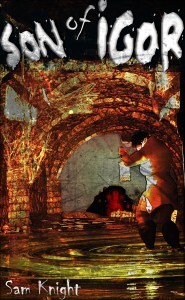
Son of Igor
This is a short story about Igor.
You know. Igor. The master’s obedient servant.
Igor is content working in secret, in the dungeon, in the filth, for the master.
Mostly.
Because no one else had ever cared for or paid attention to Igor. But when Igor finds a new friend in the sewer below the castle, things change…
99¢
Available in e-book only.
https://books2read.com/u/b6Be9J
I had a lot of fun writing this story, and I hope that shows when you read it!
April 29, 2024
The Murderbugs anthology is out now!
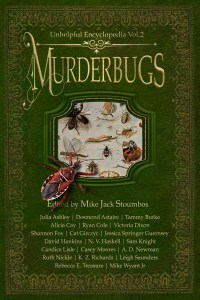
Unhelpful Encyclopedia vol. 2: Murderbugs is out now! (Audiobook to be released sometime this summer, I am told!)
My story in it is “Blue is the New Gold” – When Mark discovers a giant land-dwelling isopod may hold the key to his fortune, he risks everything and ventures into the Abandoned Lands
That will be the second Abandoned Lands story to be set free. (Following “Junkyard Rex,” in the Instinct: An Animal Rescuers Anthology.)
But there is a swarm of great stories by great authors in here!
(I copied this from the Table of Contents. Don’t tell anyone…)Assassin Bug: “Fangs Out” by Victoria DixonBee / Wasp: “The Rise and Fall of Frankie’s Patisserie” by David HankinsBlack Widow Spider: “A Widow’s Word” by N. V. HaskellCricket: “The Tell-Tale Cricket” by Candice R. LisleDragonfly: “Who Should I Feed to the Dragonfly Tomorrow?” by Ryan A. ColeFirefly: “A Firefly’s Conscience and the Psychopath” by Tammy F. BurkeGold Bug: “Gold Bug Fever” by Shannon FoxMidge Fly: “Wings Like Broken Glass” by Ruth NicklePeacock Spider: “The White Widow” by Alicia CayPraying Mantis: “Eugene, Such a Sweet Boy” by Julia V. AshleyPillbug: “Blue is the New Gold” by Sam KnightScarab Beetle: “You Are the Mother of Doomsday” by Desmond AstaireStink Bug: “The Tomato Liberation Front” by Cat GirczycTarantula: “Daring Geni, the Amazing Arachnidian Astronaut” by K. Z. RichardsTardigrade: “As Alive as We” by Rebecca E. TreasureTermite: “Hive” by Jessica GuernseyVampire Moth: “Cheddar Hunts a Vampire (Moth)” by A. D. NewmanWar Widow Spider: “Widow’s Feast” by Casey MooresXeno Bugs – Blue Bugs: “Where the Light Ends” by Mike Wyant Jr.Xeno Bugs – Callibrini: “Where All Memories Are One” by Leigh Saunders
Something that I think is pretty cool: I personally know most of these authors! I have to say, that is a really, really cool point in a writing career.
February 14, 2024
Permutations: A Well World Anthology
I am excited to announce I will have a story in Permutations: A Well World Anthology!
This collection, to be released in March 2025 from Arc Manor Publishers, is the first to be authorized by Chalker’s estate since Jack’s passing in 2005, and contains twelve new stories set in the universe created by the late Jack L Chalker and first introduced in the novel, Midnight at the Well of Souls.
That novel recently had a re-release, which you can find here: https://amzn.to/3HY6meI (My Amazon Affiliate link.)
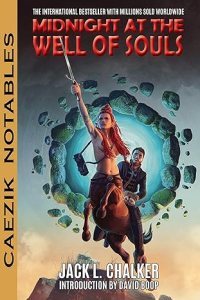
I haven’t had a chance to see the other author’s stories, but I’m really looking forward to it! David Boop, who you may have noticed did the introduction on the reissue of Midnight at the Well of Souls, wrote a “connecting” story to bring the characters from all the other stories together and into the Well World. I did get to read that, and it made me really excited to learn more about the other authors’ stories!
Here is the blurb (that I’ve seen. This far out, things always change!) and the Table of Contents (nothing there should change!). I haven’t seen any cover art yet, but I’ve heard rumours and I am very excited about that!
Permutations: A Well World Anthology revives Jack L. Chalker’s legendary series, bringing together exceptional talent to extend its universe. This collection, authorized by Chalker’s estate, gathers renowned authors like Neal Asher, Catherine Asaro, and S.P. Somtow, each adding their unique flair to the Well World legacy. These stories pay homage to a series that has influenced countless science fiction writers, selling millions of copies worldwide. Fans and newcomers alike will be captivated by the rich, imaginative tales that continue the journey in the Well World, a testament to Chalker’s enduring impact on the genre. This anthology isn’t just a collection; it’s a gateway to rediscovering a world that has shaped science fiction, inviting readers to explore its depths once more.
The passengers and crew of the luxury starship, Euphrates, may come from different backgrounds and class levels, but what they all have in common is secrets. When their cruiser is attacked by Anti-com terrorists, the ship that comes to rescue them, however, contains a bigger secret than all of them combined. A secret that will leave them irrevocably changed physically, mentally, and emotionally. For the captain of the freighter Stehekin is both savior and devil. He’ll be forced to drop them through a dimensional gate to a place where they’ll wake up no longer as human beings. As these cursed souls adjust to their new reality, they’ll find out quickly that, on the Well World, you adapt…or die!
Permutations: A Well World Anthology contains twelve NEW stories set in the universe created by the late Jack L Chalker and first introduced in the novel, Midnight at the Well of Souls. Each tale is written by an author and fan of Chalker’s groundbreaking and award-winning series spanning ten volumes. Set in a time after Midnight, these original short stories are the first to be authorized since Jack’s passing in 2005. Nine vignettes will be bookended by stories setting up the situation that forces these unwitting travelers to be stranded on the Well World, a place that turns you into one of 1560 different alien species.
Conceived by best-selling editor David Boop (who wrote the author bible, as well as the bumper stories), Boop sought out creators influenced by Chalker’s work; many who were also Jack’s friends…and family! Permutations contains a story co-authored by Jack’s daughter, Samantha Chalker! Additionally, you’ll discover adventures by best-selling and award-winning authors such as Catherine Asaro, S.P. Somtow, Jennifer Brozek, Keith Olexa, and Marsheila Rockwell, plus a forward by the legendary Neal Asher.
Table of Contents
Forward – Neal Asher
Introduction – David Boop
1. Aboard the Freighter Stehekin
2. South Polar Zone, The Well World
3. Avrom – (Somtow Sucharitkul – S.P. Somtow)
4. Wuckl – Keith J Olexa
5. Lamotien – Sam Knight
6. Oolakash – Elektra Hammond
7. Dunh’gran – Davis Ashura
8. Betared – Marsheila (Marcy) Rockwell
9. Agitar – Jennifer Brozek & Samantha Chalker
10. Alestol – Arlen Feldman
11. Boidol – Catherine Asaro
12. Above the Borgo Pass
October 23, 2023
The 2023 Novel Writing Tools Bundle

(This is the same post I put on Facebook, so if you read it there, there is nothing new here!)
#nanowrimo2023 is almost upon us! If you are a writer, and you are doing it, are you prepared?
Admittedly, I have a vested interest in this bundle, but, I have been taking advantage of it, too! (And, full disclosure, I am friends with and love some of these people dearly.)
Here are what I’ve read so far!
Drawing Out the Dragons by James A. Owen: this one is inspirational! If you are feeling unmotivated or maybe a bit downtrodden, James has some thoughts for you to mull over. The really good news here is, if you like what he’s saying here, he has a couple more in this series you can go find as well!
52 Ways to Get Unstuck by Chris Mandeville: Writer’s block got you down? Chris has 52 ways to get you out of the rut! And even if you are not stuck, she, too, has some thoughts for you to mull over that will likely motivate you!
Beyond Prince Charming by M. L. Buchman: Some seriously good insights here. I mean, some of this is the kind of thing you know, but you don’t know you know until someone says it out loud, you know? Reading this one may just change your approach to writing characters and dialog.
Making Story Models by Martin L. Shoemaker: This book was like a whole new way to look at plotting for me. As a “pantster,” meaning I usually make the story up as I go, I was floored by the way Martin laid this out and actually made me feel like maybe I wanted to plot books. There are some cool, logical, easy to follow perspectives in here. Almost like a connect the dots for plotting. Really.
How to Write Faster With Your Word Processor by Geoff Hart: I’m still working on this one. But so far, I’m down with it! People don’t often beleive me that I forgo Adobe InDesign (which I used in the past) and make my print book files with Word. I’ve been told it can’t be done, after I said I did it. Anyway, it’s nice to see someone else flexing the power of the word processor and I’ve learned some, and expect to learn more.
Blood From Your Own Pen 2nd Edition by Sam Knight: Okay. I have read this one. Like 50 times. Because I wrote it. But here’s the thing: I put in a ton of things that took me years to learn that I wish someone would have just, right off the bat, said, “That’s not important,” or “Why are (or aren’t) you doing this?” I was once asked what reference book I keep on my desk and refer to the most. Well…it’s this one. The one I wrote. Because I put the things in it that I couldn’t ever remember and had to keep looking up. If you are starting out as a writer, this has the stuff in it I wish someone had told me.
Personally, I feel I got my money’s worth already, and I still have 8 more books to read!
Nano, here I come!
(No, just kidding. If you know me, you know I don’t do Nano anymore. But I still think it’s a good thing. If you are a writer, and you don’t know what #NaNoWriMo is, you should look into it: https://nanowrimo.org/ It is motivational and a great way to meet other authors and make lifelong friends.)
September 27, 2023
NaNoWriMo is Coming. Are You Prepared?
I’ve written about NaNoWriMo several times in the past. If you’ve read those, you know NaNo is not for me, but I still think it’s a good thing
If you don’t know, NaNoWriMo is short for National Novel Writing Month and it takes place in November, and the basic idea is to, well, write a novel in a month.
For some writers, this is just the kick in the pants they need to finally get going. For others, is it like Old Home Week. They get together with old friends and make new ones and talk about, and make, exciting things. Some plan this month out several months in advance, making an outline and planning the novel so they can jump right in and write it. Others, like me, tend to write by the seats of our pants, making things up as we go. There’s really no wrong way to NaNo, as long as you’re having fun.
But the fun does end.
Eventually, you have to edit what you wrote, and I know very few authors who enjoy that. There are some, but we are few and far between.
Wait…
Did I just say “we?”
Yup. I did.
Once upon a time, I got my first “professional” edits back from a professional editor who had gone over my first novel. And I all but cried. I put that novel aside for over a year before I went back and looked at the edits again. I ended up cutting close to 30,000 words from that novel. I almost didn’t publish it. (I was goaded into publishing it by a few people who had read it and really liked it.)
In the years since then, I have read hundreds, maybe thousands, of unpublished works (long and short) from authors trying to figure out what to do and how to do it. The more I read those, the more I started to recognize reoccurring issues in their writings. Issues I had in my writing as well. Little things that add up to eventually throw the story off kilter and send it listing sideways into the dustbin. Little things that once I saw them, I couldn’t unsee them.
This had a side effect: I stopped doing them in my writing. I started recognizing the mistakes as I made them, so they didn’t go into the writing.
Eventually, my writing got better.
Which meant, editing became easier.
Which means I actually like editing my own stuff now. Why? Because when I go back through it to self-edit, the things I change tend to be related to the story and the characters. I add cool new ideas in, instead of deleting or re-writing whole chapters that were plagued with misplaced modifiers, ambiguous pronouns, run-on paragraphs, or worse, just gaping plot-holes and rambling narrative.
Now when I go back and edit, I can add in things that resonate across chapters or the whole novel. I can play with whitespace. I can play with the rhythms of my sentences and paragraphs, and enjoy doing it.
My point is, the more you know, the fewer mistakes you make while putting things together. The fewer mistakes there are at the beginning of a project, the fewer things there are to be fixed at the end. Which makes the whole thing more fun.
In 2018, I wrote an article for for NaNoEdMo, or National Novel Editing Month, which takes place in January, for all the authors who wrote novels in November. I am sorry to say that, while you can still find references to NaNoEdMo, the website is gone, and few people talk about it. Probably because few people like to edit their own stuff. (I’ve reposted that article at the end of this post.)
So, I feel pretty lucky that I enjoy revisiting my stories after I’ve finished them.
Anyway, as you gear up for NaNoWriMo, consider adding one of my tools to your pack. I suggest reading it before you start NaNo, so you can apply the knowledge from the beginning of the project.
You know… I shouldn’t admit this, but someone once asked me what reference tool I used the most, and I told them the one I wrote. Because, all the things I can never remember, I put in it, right where I could easily find them.
I had fun editing this one, too. Honest. The whole point of the 2nd edition was to fix a couple of mistakes and update some of the self-publishing information that had gone out of date, but I ended up adding around 40,000 words. That’s a whole ‘nother book, let me tell you. And that didn’t happen because it wasn’t fun. I enjoyed it.
Here is that reposting I promised:
The Little Things Matter — Sam Knight
(Originally published in 2018, at http://www.nanoedmo.com/little-things...)
There are a few things in life that make everything else a lot easier, if only you know them. But they always seem to be hard lessons to learn. Sometimes people won’t tell you something because they think you already know. Or they don’t care. Or they think it’s amusing that you don’t know. Or it’s not their job. Or they are too embarrassed for you.
Life is full of little things like that. Like knowing that if you close the zipper on your pants by pointing the pull tab on the slider down, it will be much less likely to unzip when you don’t want it to. Some people have no idea that some zippers have a little pin lock that fits into the teeth of the zipper and stops the slider from working its way down. See? Life hack.
One I learned the hard way.
Like knowing that you can put soda in a sippy cup—but not one that uses a straw. Because it squirts out at you. Another lesson learned the hard way.
Writing is the same way. Sometimes there are little things you didn’t know about that can change everything, and that’s why I decided to write this guide.
The above quote is an excerpt from the introduction to my book, Blood from Your Own Pen. I decided to open this article with that not because it is a shameless plug (although I embarrassedly admit that it is…) but because it conveys the idea I wanted to bring to your attention:
The little things matter.
It’s the little things readers notice (or don’t) that add up to create an overall impression of the quality of your writing. Have you ever read a really good story, but you could tell it hadn’t been professionally published because of the all the little mistakes? Have you ever read story you didn’t like, but you “knew” it had been professionally published by the way everything else was perfect?
Some of those things are easy to spot and recognize. Some of them, some writers do automatically, without thinking about them or even being aware of them. But some are the result of trial and error and authors learning what works and what doesn’t.
The next time you write or edit a story, here are some things I would like you to keep in mind. I am not asking you to try to inject them into a story you’ve already written, I am merely asking that you be aware of them. Some of these may seem obvious, once you realize they exist, and some are eternally confusing (at least to me). Either way, merely being aware of them can help you take advantage of using them, or, if they are a mistake, help you to avoid them.
I don’t have enough space here to go over each of these thoroughly, so if any of them are a new concept for you, or if you don’t feel you completely understood something, please take the time to do some research. In the long run, you will be a better editor, and writer, for knowing them.
Consistency-This is probably one of the biggest rules for me. Be consistent. I don’t mind if an author chooses to use “toward” or “towards”, “gray” or “grey”, or a hundred other things people quibble over, but they need to pick one and use it, not switch back and forth in the same story. This applies to grammar mistakes, punctuation mistakes, the preferred spelling of an archaic name, and just about anything else. I can read around a consistent “mistake” I don’t agree with, but I can’t enjoy a story when the writing keeps changing. (Especially when it’s the name of a character or a place!)
Raising Questions in the Narrative- A subtle way of filling plot holes, or at least covering them up, is to mention them in the story. If a character ponders the “why’s” and “how’s” of something, even if they never reach a satisfactory conclusion, readers tend to accept the issue as having been addressed. This technique can save a huge re-write, if properly applied.
Starting Sentences with Pronouns and Proper Nouns- Repeatedly starting sentences with pronouns and proper nouns creates a repetitious pattern that carries over into the rest of the writing and affects the flow and pacing of the story. Scroll through the story and check to see if every (or most) paragraph starts with the main character’s name (or “he”, or “she”). If they do, then there is a good chance that nearly all paragraphs, and the sentences within them, follow the same structure. This will create a story that can be less interesting to read.
Repetitive Word Use- Most of us know that reusing a word in the same sentence, or the next one, can catch a reader’s eye and look strange, but using an uncommon word repeatedly in a story, even chapters apart, can also make it stand out to a reader (which ruins the reading experience), especially if it is a word they don’t know or don’t like. Some words shouldn’t appear in a story more than once or twice at most.
Redundancy- Many of the things we write have implied meanings, but we feel the need to add on a descriptor of some sort anyway. This creates a redundancy that some readers don’t notice and others are thoroughly irritated by. Removing these is a great way to avoid “wordiness”, reduce word count (if you have a limit), adjust the pacing of a scene, and generally “clean up” the prose.
Example:
Bobby chewed his food slowly as he ate.
We already know Bobby is eating, because he is chewing his food.
White Space- White space is very closely related to pacing. Too much or too little of it can have a detrimental effect upon the story. A full page of text, with few or no indentations showing new paragraphs, becomes an intimidating block of words that most people dread trying to read. Too much white space, such as three or four pages of dialog consisting of short statements by different characters, can look strangely messy and can just “feel” wrong.
For an example of the power of white space, look back to the top of this article, where I set the line “The little things matter” on a line all by itself, with white space above and below. Do you feel like that gave it an air of importance?
-ly words- Many adverbs are redundant and don’t add much to the description. Sometimes they detract from the pacing and impact of the other words. Overuse of descriptive adverbs can make a story seem amateurish as the author appears to struggle to get every (unnecessary) nuance of description onto the page. Limiting the use of adverbs will also increase impact of the ones still in the story. I use the global search function to search for “ly” so that I can easily find the adverbs and re-evaluate them on a case-by-case basis.
Vague Time Periods and Measurements- Sentences mean next to nothing when the descriptors in them have no basis for comparison or contrast. While they are fine when used in colloquial dialog, the use of vague descriptions in the narrative can hinder the reader’s understanding. Sometimes the answer is found in the adjacent sentences, which is also fine, but sometimes the author forgets to add in that extra information.
Examples:
They were small. (Compared to what? An ant? Or Godzilla?)
It was long.
There were a lot.
After a while we went home. (After ten minutes, or two hours? The difference can show the dedication of a character.)
Rarely did he cheat on tests. (But he does cheat, so telling us how often helps us better judge the flaw in his character.)
Later, they got married. (This makes time pass unusually fast. Are we skipping hours or years?)
Poor Contrasting- The words “so”, “really”, “only”, “very” and “just” are some of the biggest offenders here. They all imply a contrast but are often used without one, which puts them in a situation where they actually convey no information. As with vague time periods and measurements, these are fine when used in colloquial dialog, but their use in the narrative can hinder the reader’s understanding and come off as amateurish.
Examples:
She was so tall.
The flowers were really yellow.
It was only a few hours.
There were just so many.
He was very big.
Meaningless Descriptors and Weak Words-These are similar to the ideas of vague time periods and measurements and poor contrasting. When writing, we tend to need a lack of ambiguity. When we describe things, either they are or they are not. They happened or they didn’t. The characters think or believe something, or they don’t. If the author is not being clear as to whether something is or is not, readers will have problems comprehending what actually happened in the story.
Words like “seemed”, “about”, and “almost”, can be good indicators this mistake is being made, as are phrases such as “it was like”, “it was as if”, and “it was as though”.
Here are some examples lifted from an early draft of my book, Lucid Nightmares:
He sniffed at the air and the taste of dank rotten garbage that had exuded from the demon seemed to fill his mouth.
Did it fill his mouth or not? It “seemed” to, but did I intend this to be a mystery? Did I want the reader to spend the next few sentences guessing about whether the stench was some sort of separate entity, or if my character couldn’t tell what happened inside his own mouth? If not, then I needed to just say that it did fill his mouth; otherwise I have weakened the description.
His good mood seemed to dissipate with the sunlight as the sun melted over the mountaintops.
Did his good mood dissipate or not? Is he in a bad mood now? Again, is this something I am hiding from the reader? If not, I needed to take the word “seemed” out of the sentence, as it weakened the description.
The reverse of this problem is also true. Readers need a lack of ambiguity, so the writer saying that something is, when it actually isn’t, can be very confusing. Make sure metaphors are not mistaken for actual things/events. If a space traveler sets foot on a planet for the first time, and the author says the ground was ashen, I need to know if I am being told it is gray or if it is really covered in ash. If a wizard opens a magical doorway to a gilded land, I need to know if the land is literally covered in gold or just bathed in golden sunlight.
Final tips on editing:
-Read aloud. Saying the words out loud requires more attention and concentration and you will find mistakes you missed otherwise. Sometimes you will discover a missing word and sometimes you will discover sentences that make no sense at all.
-Read the story “backwards”. Start at the last line and read each sentence, or paragraph, out of the normal context. This will help you pay less attention to the story and more to the sentence structure. This is good for finding things like sentence fragments and misplaced modifiers.
A final recommendation:
One of the first things I did, when I decided to become serious about writing, was make myself a list of things I felt I needed to make sure I hadn’t done. Kind of like the opposite of a to-do list. It was a list of things I knew I always get wrong, or to remind myself of lessons learned hard.
The list had “search and destroy” words, like “realized”, “slowly”, “suddenly”, and “really”. (Pretty much all –ly words, actually.) It had a reminder to run spell check 3 times, because sometimes spellcheck has problems with larger documents, and a reminder to search for extra spaces between sentences and at the end of paragraphs. (Those can really screw up formatting.) Searching for “was”, “were”, and “by” reveals most places I used the passive voice.
I highly recommend you make your own list. We all have our own idiosyncrasies, so you should make a list that works best for you. Don’t be afraid to add new things to the list as you find them. New things on the list mean that you are still learning, still growing, and still improving. And that is a goal all editors should strive for.
A final word of encouragement:
We all make mistakes. We all miss things. It doesn’t mean we should give up. There will always be one more mistake, one more typo, and one more thing. Don’t get overwhelmed by it, and don’t let it eat at you.
When I finally published my book on editing (which you know I edited the crap out of!), I started finding mistakes. A lot of them. In spite of the fact that it had gone through two professional editors (Neither of which were me. I know better than to trust only my eyes on my own work.), a proof reader, and a half-dozen beta readers. Some of the mistakes are just flat out embarrassing. But, there they are. It happens.
And when it happens to you, learn to roll with it. Editors, just like writers, have to develop thick enough skins to withstand the criticisms. We need them so that we can learn and grow and improve.
Now, go get ’em, tigger!
September 7, 2023
Murderbugs!
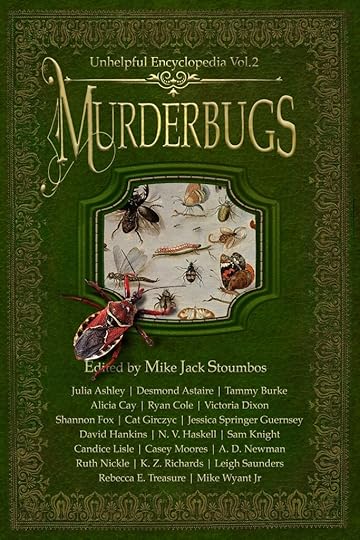
I am excited my next Abandoned Lands story will be part of the upcoming Murderbugs anthology!
Unhelpful Encyclopedia vol. 2: Murderbugs is gearing up for a kickstarter that launches on 9/15/2023. You can follow it here:
“Blue is the New Gold” – When Mark discovers a giant land-dwelling isopod may hold the key to his fortune, he risks everything and ventures into the Abandoned Lands
July 30, 2023
Titles on Sale at Amazon
Sometimes the best way to get a book cheap is to watch Amazon for their random price drops. It’s silly. I think they decide a product isn’t moving, so they discount it to get it out of their warehouse, and then it sells, so they order more to stock their warehouse. Whatever. As long as people get to buy books for cheap, right?
Here is a list of books that I have stories in, or edited, or published, or something, that are currently on sale at Amazon. Please note, I am providing affiliate links, so, if you use them, I may get a few cents for directing you to Amazon (if you buy something). Also, a lot of these books, Amazon says stuff like “Only 2 left in stock!” What that happens, the price may go back up after people buy them, so don’t be too disappointed if the price is different than what I say here. I mean, it’s a random Amazon sale. I’ve got no control over it.
That said, sometimes (because I have Prime) I can get these books cheaper this way than from the publisher or even the printer when I am the publisher. So, if you are an author, I strongly suggest you create an Amazon Author Central account and list all of your books so you can drop in and check prices too. Especially if you like to purchase books to resell at conventions or something.
Gilded Glass: Twisted Myths and Shattered Fairy Tales
Paperback $7.49
List Price: $16.99
Save: $9.50 (56%)
Hardcover $16.67
List Price: $34.99
Save: $18.32 (52%)
Monsters, Movies & Mayhem
Hardcover $18.99
List Price: $36.99 Details
Save: $18.00 (49%)
Planet of the Apes: Tales from the Forbidden Zone
Paperback $12.23
List Price: $14.95
Save: $2.72 (18%)
Particular Passages 2: East Wing
Paperback $10.48
List Price: $16.99
Save: $6.51 (38%)
Particular Passages 3: West Wing
Paperback $12.37
List Price: $16.99
Save: $4.62 (27%)
The Best of Penny Dread Tales
Paperback $11.39
List Price: $15.99 Details
Save: $4.60 (29%)
Six Guns Straight From Hell 3: Horror & Dark Fantasy From the Weird Weird West
Paperback $3.65
List Price: $15.95
Save: $12.30 (77%)
Mermaidens
Paperback $6.34
List Price: $17.99
Save: $11.65 (65%)
Domesticated Velociraptors
Paperback $9.84
List Price: $14.99
Save: $5.15 (34%)
Cthulhu Passant
Paperback $4.72
List Price: $7.99
Save: $3.27 (41%)
Well… It’s Your Cow: An Anecdotal Anthology
Paperback $10.51
List Price: $19.99 Details
Save: $9.48 (47%)
Welcome to the Alpacalypse
Paperback $6.29
List Price: $14.99
Save: $8.70 (58%)
Freakend Madness
Paperback $3.23
List Price: $6.99
Save: $3.76 (54%)
From the Corner of Your Eye: A Cryptids Anthology
Paperback $5.20
List Price: $14.99
Save: $9.79 (65%)
June 5, 2023
My next Abandoned Lands story, Blue is the New Gold
I am excited to announce my next Abandoned Lands story, Blue is the New Gold, will be published in WonderBird Press‘s Murderbugs anthology, edited by Mike Jack Stoumbos.
There are some great authors about to be announced for this project!
AND!!!
They are having a drawing for a chance at Tuckerization (I have no idea what story! So exciting!) in one of the stories BUT you have to get this filled out by end of day June 6th! https://docs.google.com/forms/d/e/1FAIpQLSd4lFPhx1LU2x4FoKSNkOeAfw2oKYAGOPrkCPFPyNafMyrj6g/viewform
If you miss this, or don’t win the drawing, I am pretty sure there will be another opportunity through the upcoming Kickstarter! https://www.kickstarter.com/projects/mikejackstoumbos/wonderbird-press-2024-anthologies-murder-bugs-and-monsters (Follow it to get notified when it goes live!)
March 10, 2023
The Abandoned Lands: Meet Xan and Booger
Welcome to the Abandoned Lands!
Here, you are pretty much on your own, because, well, it’s mostly abandoned.
You know, except for the dinosaurs and the outlaws.
If you are coming here to learn a little more about the Abandoned Lands because you read my story Junkyard Rex in Instinct: An Animal Rescuers Anthology, thank you! I hope you enjoyed the story.
If you haven’t read it, or haven’t heard about the anthology, boy are you missing out! You can remedy that here: https://amzn.to/3mJOyNf (that’s an affiliate link, so I may get a few pennies if you use it.) Also, approximately 70% of the profit from the sales of that anthology go to Lifeline Puppy Rescue. As of this writing, over 11,000 copies have been sold, which roughly translates into funding to rescue over a thousand puppies. We are very proud of that. Thank you if you supported it!
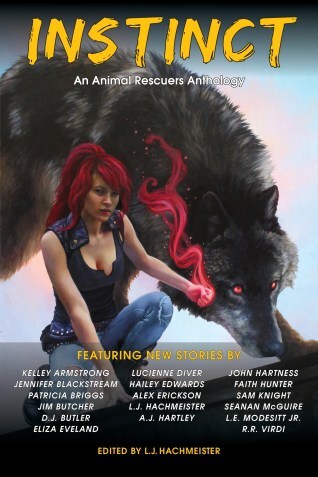
Though a stand-alone story, Junkyard Rex is a prequel of sorts to the novel I am almost finished writing: A Girl and Her Velociraptor.
Meet Xan and Booger. (Xan is the tall one.)

Best friends forever.
Here is a quick scene from the book:
Booger kept trying to sniff at the bandage on Xan’s arm as they headed toward the barn, so Xan finally stopped walking, sat down the egg bucket, and held her arm out for the velociraptor to inspect. Booger took a deep whiff and then snorted at the bandage. Stepping closer, she leaned her feathered head against Xan’s side.
“It’s no big deal,” Xan said, stroking Booger’s neck. “Only two stitches.”
Booger thrummed under Xan’s touch, and they stood like that for a moment, watching the setting sun turn the western sky orange.
“Are all of the chickens in the roost?” Xan finally asked.
Tipping her head upwards in a nodding motion, Booger barked a quiet yep.
“Let’s go count and make sure so Dad doesn’t get mad if you missed one.”
Booger snorted.
“I know you’ve never missed one, but it’s my butt if you do, and I don’t want to feed one to the nippers.”
Xan picked up the egg bucket and continued on.
“Speaking of which, did you find any nippers today?”
Booger snorted again.
“I know they’ve learned not to come here because you live here, but even if it’s an easy job, it’s still your job.”
They walked to the side of the barn where the three-foot wide chicken ramp had been extended down from the second story of the two-story barn. Booger eagerly bounded up the sloping ramp, using the tips of her claws to catch purchase in the holes of the metal mesh. Xan followed with big, loping steps, using the raised metal ribs between plates for footing, swinging the bucket as she went.
The chickens squawked at the velociraptor’s appearance in their roost. Booger sat down at the top of the ramp, watching them, apparently enjoying the commotion.
“Thank you for not riling them all up this time,” Xan said as she reached Booger’s side.
Booger lifted her head and made a soft cooing sound.
I hope you come back to read about the adventures these two have together when the book comes out!
(If you are an agent and interested, I’m still looking!)

